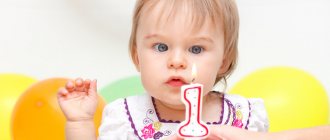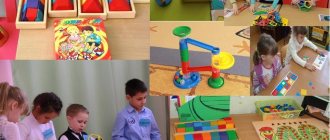The first three years of a child are especially important for upbringing. In the first two years, the child listens and remembers, and starting from the age of three, he begins to repeat what seemed especially interesting and significant. If you miss this period and do not develop the correct behavior patterns in your child, then in the future it can be very difficult to re-educate him.
There are two main stages in the development of a child: from one to two years, and from two to three years.
Age from 1 to 3 years – the period of character formation
Psychology of a child at 2 years old
The phenomenon of the two-year crisis is familiar to many parents of babies. Sometimes a child at this age literally transforms, begins to be stubborn at every step and show disobedience. With childish tenacity, he rejects any demands and, with the help of protest, asserts his “I”.
The psychology of a child at 2 years old, both girls and boys, undergoes significant changes. At this time, the baby begins to realize his individuality, he learns to manage his body and control natural functions. He understands that he is not one with his mother, but is an autonomous person.
To emphasize his independence, the baby resists any requests and in every possible way resists the pressure of his parents. Only by opposing himself to adults does he embark on the path of individualization. Parents simply need to survive this period, since without it further formation is impossible.
Features of the psychological development of a 2-year-old child:
- The baby learns to imitate. A parent or teacher is a standard for him.
- Speech develops quickly and vocabulary expands. The baby can perform complex actions at the request of the parent. He tries to understand what adults are talking about and take part in the conversation.
- He is not yet very interested in his peers. His favorite activity is studying objects, and at this stage it is necessary to help the child study their properties.
- The baby begins to master generally accepted norms of behavior.
- He is not able to plan his actions and actions. The child acts spontaneously, under the influence of an impulse.
- The baby explores his body and its properties in various positions and begins to use facial expressions.
The baby tries to control himself physically and psychologically (sits on the potty on his own, refuses to fulfill requests, runs away from the adult during a walk). At 2 years old, a sense of autonomy appears in the child’s psychology, which needs reinforcement.
Adults need to be patient and flexible. There is no need to try to break the child’s stubbornness, but you also cannot give in endlessly; there is a risk of raising a domestic tyrant. It is better to distract the baby, switch his attention to something interesting and fun. This will help avoid confrontation. It is necessary to praise the child for every achievement, stimulate his creativity and imagination. He must feel that his opinion is respected and that he is taken into account as an adult. But in matters related to the health and safety of the baby, you should be firm. He will quickly learn that in some cases it is useless to persist.
Potty training difficulties
When your child turns two years old, potty training should begin actively. Some children start using the potty earlier, others later. There is no specific norm here. If you put in patience and effort, the result will definitely appear.
Potty training should begin at 1.5 years of age
Tips for potty training parents:
- Accustoming should begin at about a year, maximum at one and a half years. However, results are most often achieved by two to two and a half years. When teaching your child, avoid pressure, be friendly.
- The potty should be placed in a convenient place accessible to the baby.
- At home, take off your baby's diapers. At first he will make puddles all over the house, but soon he will understand where they need to be made.
- Place your child on the potty when his desire to go to the toilet is clearly noticeable. If the child is busy playing, and you tear him off and forcefully put him on the potty, training may be significantly delayed.
- Transformable pots have appeared on sale. The child can first use it like a regular potty, and then sit on a potty attached to the toilet.
Transformable pot 3 in 1
Features of behavior and psychology of a child 2–3 years of age
There is no talk at all about the correct behavior of a child until he reaches 3 years old. At this time, his actions are dictated by the characteristics of his temperament. The child may behave unpredictably, changing his preferences many times during the day.
The psychology of children from 2 to 3 years old has its own characteristics:
- A craving for new activities awakens. At this moment, it is important to provide the opportunity to master them.
- Kids make leaps in mental development. Exercises should be aimed at developing motor skills; appliques, modeling, and lacing are suitable. These types of activities improve imaginative thinking and memory.
The psychology and development of a 2.5 year old child is characterized by the emergence of independent activities and the formation of imagination. There is no need to overload your baby with developmental exercises; it is useful for him to play with toys. It is advisable to purchase several dolls, cubes, animals and construction sets. At the age of two, a child builds intricate structures from toys. He feeds and puts dolls and animals to sleep. At the same time, the baby speaks on behalf of each of the characters. These are normal psychological characteristics of the behavior of children 2–3 years old.
To develop a preschooler’s memory, you need to read poetry to him. If the child is able to easily remember short poems, then you can try to learn other information (names and surnames of relatives, address, age). It is advisable to read fairy tales and poems every day, it helps develop speech. Fairy tales by Pushkin, poems by Barto, Chukovsky and Marshak are suitable. At 2–3 years old, children learn new languages well; this time should be used to study them, especially if the child’s parents are of different nationalities.
The psychology of children 2–3 years old is such that difficulties often arise with their emotional state. The kid finds out the limits of his influence through protest. At this age, the child strives to do everything on his own. To prevent this desire from disappearing, you need to allow him simple actions that he can master.
Strict prohibitions often lead to hysterics and aggression. Therefore, the psychology of raising children under 3 years old includes presenting information in the form of a game. This will relieve tension and prevent a fit of hysteria. At this age, the first manifestations of anxiety are possible.
If at this age psychological trauma was sustained due to stress, fear, fright, in the future the person will need psychological help, which should be provided by a specialist, for example, psychologist-hypnologist Nikita Valerievich Baturin.
Teaching your baby to be independent
Accustoming to independence is an important stage in raising a child under three years of age. Closer to the age of three, the child begins to identify himself as an individual. At this moment, it is very important to let him understand that independence is a good quality.
Don’t try to do everything for your child yourself. When getting dressed for a walk, wait until your baby puts on his shoes himself, even if he does it for a very long time.
Teaching independence is an important element of education
In fostering independence, it is very important not to cross the fine line between patience and indulging children's whims. Be a helper rather than a strict mentor for your child.
Important: Your child will not be able to do everything right the first time. Be prepared for this and be patient. It is very important to raise a confident, uncomplicated person.
An example would be a situation where a child tries to eat soup with a fork. Parents try to explain to the child that they need to eat with a spoon and take away the fork. However, this is not entirely correct. To help your child become independent, explain to him once that soup is eaten with a spoon, but leave the fork too. After a few attempts, the child will understand that it is impossible to eat liquid soup with a fork.
Raising children is a difficult but interesting responsibility for every parent. By following proven tips, you can significantly simplify the process of raising a baby and achieve great success. Every parent should raise their children correctly.
Development of speech and articulation skills
At two years old, a child understands a lot and often speaks well; his vocabulary quickly expands. You need to talk to your baby as often as possible. It has been noticed that children with silent parents master speech much later. Phrases should be concise, but at the same time emotionally charged. You cannot distort words when talking to a child.
Children who have sisters and brothers speak well already at the age of 2 years. They express themselves in simple phrases about what is interesting to the baby. Older children use actions and commands in their games that require execution. This helps develop speech skills. This is not the case in games with peers.
In the games of two-year-old children, an adult or older child should participate, who initiates joint actions (for example, preparing Easter cakes, building a house). This will help kids act collectively, compete and interact through speech.
A manual on child psychology for parents of 2-3 year old children recommends:
- play games with imitation sounds. Kids love it and at the same time develop articulation skills;
- look at books and invite him to complete simple phrases himself;
- pronounce or sing complex words;
- study the properties of objects, for example, soft toys (color, size, temperature, etc.);
- learn tongue twisters and songs.
Parents play an important role in the development of a child's speech. Much depends on their efforts and patience. But you shouldn’t harass your child with continuous activities and comments. The development of speech should be carried out in the form of a game and end at the moment when the preschooler loses interest and his attention is scattered.
Magic pill
Who among us did not dream as a child of a magic pill to make some dream come true? It’s so great - you took a pill, and all possible knowledge is in your head. Or, for example, I learned to play the violin. Well, or he just became a good person. But in real life, things are not so simple. In order to change for the better, you need to work long and hard on yourself.
What do we have to do with it? We're talking about raising children, aren't we? For some reason, some parents believe that a child has been born, is growing, there is still a lot of time before he comes and says: “Mom, dad, I’m an adult now.” And this means that you don’t have to rush with upbringing, you’ll have time. Or they think that one day a miracle will happen and their child will suddenly become a wonderful person and generally a unique personality. Only here we need to work. Climb over all surmountable and insurmountable obstacles, experience puberty and work, work. After all, if you want your wonderful baby to become an equally wonderful person, know that your contribution to this transformation must be huge. And you need to start as early as possible.
Psychology of boys and girls before and after 2 years of difference
At the beginning of the 3rd year of life, babies begin to realize that they belong to one of the sexes. Until 2 years of age, there is no gender self-identification. Awareness comes earlier if the child attends a children's group. It can be noted by dividing children into groups to play together.
Features of the psychology of a child 2–3 years old, boys:
- do not like repetition in learning;
- perceive information more visually than auditorily. Therefore, it is better to show them than to tell them;
- Despite popular belief, boys are sometimes more emotional than girls. There is no need to forbid them to cry if there is a good reason for this;
- Boys use their distant vision more, so they need a lot of space for entertainment. They love active activities (catching up, fighting, playing with a ball);
- love toys that involve transformation and movement: cars, construction sets, cubes, etc.;
- they strive to compete, to stand out, this desire can be redirected to sporting events.
Boys need to be taught respect for girls from an early age. Explain that fighting with them is unacceptable. Talk about the role of a man in the family as a protector and head. It is better for the father to do this and demonstrate by example how he treats women in the family.
Differences in the psychology of a 2–3 year old child, girls:
- knowledge is better perceived step by step, they like repetition and consolidation;
- information is mainly perceived in audio form, so it is better not to show it to them, but to explain it to them;
- girls are partial to bright and beautiful things. For games, dolls and soft toys are suitable for them, with which they can act out scenes;
- they are sensitive to affection and need more affection than boys.
For girls 2–3 years old, you can purchase sets of dishes, furniture and household appliances so that they can play housewife. They strive to imitate their mothers and love to help with housework. This will help develop their desire to take care of someone and show maternal feelings.
Let's summarize what has been said
Each age period has its own characteristics. In any of them, the baby learns something new. This requires proper upbringing.
Before you start raising your child, understand the characteristics of each age. Engage with your children, spend at least part of your time just playing with them. Teach your kids to order and take care of themselves in early childhood. And most importantly, follow the regime yourself, because the baby is your little copy.
Author: Dmitrienko Natalia Ivanovna, educational psychologist
Consultation with a psychologist about the causes of bad behavior in children
We recommend reading: Problems that most parents face
Author
Natalia Dmitrienko
Educational psychologist
Has a higher pedagogical education, specialty “educator-psychologist”. He understands issues of education, child and family psychology. All articles by the author
I like!
Tasks for children who have not yet mastered speech
A 2-year-old child does not always know how to speak. This should not be a cause for concern if he understands when he is being addressed, fulfills his parents’ requests, and looks straight into the eyes during communication. He will definitely talk over time. We need to talk to him more, read books, sing songs to him. It is also important for intellectual development to use fine motor skills.
The formation of speech depends partly on the physical development of the baby. In addition to fine motor skills activities, he should be allowed outdoor games (riding a bicycle, climbing on sports equipment, stairs). It is useful to purchase a sorter toy with at least 4 different shapes. During the game, you need to name the geometric shape and feel the boundaries of the contour with your fingers. Place into the appropriate hole.
The boy cannot be limited in pouring water and pouring any objects from one form to another. You just need to first create a platform that is easier to clean. You can make appliques, cut out, sculpt balls and sausages from plasticine, and draw shapes. All these actions are beneficial for the baby's development.
Let's talk about the daily routine
Previously, the regime was treated with full responsibility. There was a regimen for feeding babies - strictly according to the clock. And it doesn’t matter whether the baby screams from hunger or, on the contrary, doesn’t want to eat, he needs to be fed by the hour. If he needs to sleep on time, he needs to be put to bed urgently. It’s okay that he is cheerful and cheerful, and there is no sleep in either eye. It is necessary to put him down, and that’s it – the regime, after all.
Now the attitude towards this has changed. Observing dystrophic and nervous babies, doctors came to the conclusion that each child has his own regime, which depends on individual characteristics. And if some baby needs 6 feedings a day, then another needs all 8. Some eat more, some eat less. Some babies maintain three sleep periods until they are a year old, while others may only sleep once or twice by this time.
In order to determine the time limits for getting up and falling asleep, parents do not need to set any goals for themselves. Go to bed at 21:00 or 21:30. A child at an early age carries out all his activities according to the needs of his body. He eats when he is hungry, plays when he is alert, and sleeps when he is tired. By gradually adjusting the time frame, parents will see that the child himself can wake up and fall asleep at a certain time. The same goes for feeding. Over time, the child develops his personal diet, which will gradually change as he grows up.
Moral education
At the age of 3 years, it is already possible to instill in children a love for their native places and develop citizenship. You should start with the development of self-respect, nobility in relation to others in everyday life, and the study of national culture. If you present it in an interesting way, children will quickly learn everything. The easiest way to instill patriotic education is through animation. There are many cartoons, both modern and Soviet, that convey noble and strong images of knights, Russian heroes, as well as brave women prone to self-sacrifice.
Crisis of two years ↑
Children grow up and now the baby, who recently was so attached to his parents, touching them with his smiling and obedience, becomes a little tyrant. Any games or activities cause protest, and mom’s words are met with hostility.
This is how the child enters a new stage of development. This transition period is marked by a crisis of 2 years.
Causes
A whole complex of reasons provokes the emergence of a crisis of 2 years:
- desire for independence;
- mastering a new scheme of interaction with the outside world;
- opening new possibilities and boundaries of what is permitted.
Children's tantrums, the manifestation of which can be very different: lying on the floor and screaming, the child does not eat well, becomes whiny, hits others. The most innocuous situation can provoke such behavior.
Does your child not want to wash his face in the morning? Read about methods of hygiene education. Is patriotic education of preschoolers relevant today? Read the article.
Read about the principles of environmental education for preschoolers here.
It is important for parents to remember that the reason does not lie in some situational factor. The problem lies much deeper. The 2-year-old crisis is an important stage, as a result of overcoming which the child gains the necessary knowledge and skills, rising one step higher in his development.
Little manipulator
A child's hysteria is a real test for parents. Here in a store he falls to the floor when he refuses to buy a toy he likes. Many mothers get lost in this situation and don’t know what to do right.
Knowledge about the child, his character, and temperament will help to cope with a crisis situation. For one, the technique of talking with a parent alone will be useful; for another, a stern shout in the presence of others will be more effective. In any case, you can’t follow the little man’s lead.
About the dangers of parental compliance
Many parents tend to stop their child's hysteria with concessions. A child struggling, screaming and crying, is, of course, not the most pleasant sight. However, having given in once, adults lose their power in the eyes of the little manipulator.
He begins to feel omnipotent and understands that now his tears are his main weapon, with the help of which he will achieve what he wants.
Parents must understand that this way of education is extremely dangerous, so it is better to prevent such a situation. To do this, the child must be explained in an accessible form what is allowed and what is absolutely prohibited. And it is necessary to adhere to this line of behavior constantly.
Advice from a psychologist to parents on raising a 2-3 year old child
Until the child reaches the age of 2–2.5 years, there is no point in punishing him. He does not yet feel like he is the culprit of the incident. He sees the result of his actions, but does not associate it with himself in any way, and does not realize how it happened. The only thing he will take away from punishment or reproach is that he is bad and is not loved.
Until a certain time, we must refrain from angry tirades and detailed explanations of what not to do. The baby still cannot understand them. At this stage, clear and reasonable restrictions and prohibitions are sufficient.
From about 2.5 years old, the child begins to feel like an independent person, and he is already able to understand who is to blame for the incident. He realizes that some actions are good and make loved ones happy, while others are bad. But he is still learning to control himself, and from time to time he will continue to act contrary.
Often at this age, children have imaginary friends to whom they shift responsibility for bad deeds. This allows the child not to feel guilty about the wrongdoing. It is important to understand the motives for his behavior. To do this, you need to discuss the incident with your child and help correct the situation. This must be done in a calm, friendly tone, then he will not be afraid of punishment and will willingly explain what motivated him.
At the age of three, children often behave badly, defining the boundaries of what is permitted and acting to spite their parents. This gives them a sense of adulthood and independence. If you punish for misdeeds, then instead of obedience the baby will show resistance. It is important to be patient at this stage; over time, the relationship with the baby will improve.
What you need to know about children under three years old?
Once born, the baby needs the care and affection of its mother. She can express her love through touching and stroking. In infancy, the baby is still unable to satisfy its own needs. Therefore, it is the mother who feeds him, changes diapers, bathes him, etc.
At six months the child learns to sit. He can already skillfully manipulate objects. Starting to sit and then crawl, the baby receives more necessary knowledge for his development.
By one year or a little later, the child acquires a new skill - walking. Naturally, due to her, he expands his horizons. Now he has more information available to him than ever before. But even during this period, the baby still cannot realize all his desires, so he cannot do without the help of his mother.
The period from one to two years is characterized by learning new words, and as a result, expanding communication with adults. Now the baby begins to communicate with his parents not only with signs, but also with words, albeit not very clear to others. Adults need to try to develop the child and already at this age pay attention to the child’s abilities.
When raising children two or three years old, it is important to take into account the fact that they can already perform basic actions. For example, collecting toys. Therefore, teach your child to have order. Do this in such a way that the child does not find this activity a burden. Turn it into a fun game. Since a child at this age strives to imitate adults, one condition must be taken into account: parents must also maintain order.
During this period, children need communication not only with mom, dad and close relatives, but also with peers. Adults should teach the child to behave correctly in a group: not to quarrel, to be able to make peace, to share toys, etc. Explain to your child what magic words are and when they should be used.
From the third year of life, the child enters a new social step. Changes in his personality become noticeable to others. He tries to do everything himself, considers himself equal to his parents and demands an appropriate attitude towards himself. Adults do not need to do for a child what he cannot do, but support his independence.
At three years old, a child is increasingly drawn to communication and knowledge of reality. Parents just need to support him in this endeavor. At this age, the baby already clearly knows his desires. By keeping the child active, parents will be able to direct him into the right field of activity in the future.
Little children love to draw. Give them this opportunity. If your child is drawn to design, do not deny him this pleasure. Some children do modeling. And, of course, every child loves to play. All of these activities help develop important processes and qualities, such as memory, thinking, perception, attention, speech. This is the age when the basis of personality is formed.
Features of organizing classes
In the age period of 2-3 years, it is necessary to work with the child in a variety of ways. At this time, education should be:
- aesthetic;
- moral;
- physical.
You have to instill in your baby the simplest self-service skills and give lessons in politeness. Three years is the optimal time for this.
The main mistake parents make is planning long, many-hour classes and trying to learn a lot of new things during them. A three-year-old needs only 10-15 minutes to gain new knowledge, after which he needs to change the type of activity.
If the baby is not in the mood to study, replace the lesson with reading, listening to music and watching educational films. The activity should be calm so that a change in the daily routine is not felt.
Psychologists recommend using sensory didactic games. They bring good results, developing the baby in several directions at once: they improve fine motor skills, improve imagination and teach them to build logical chains. An example of such a game is mosaic. First, lay out the patterns together, and then let the baby create a picture on his own.











